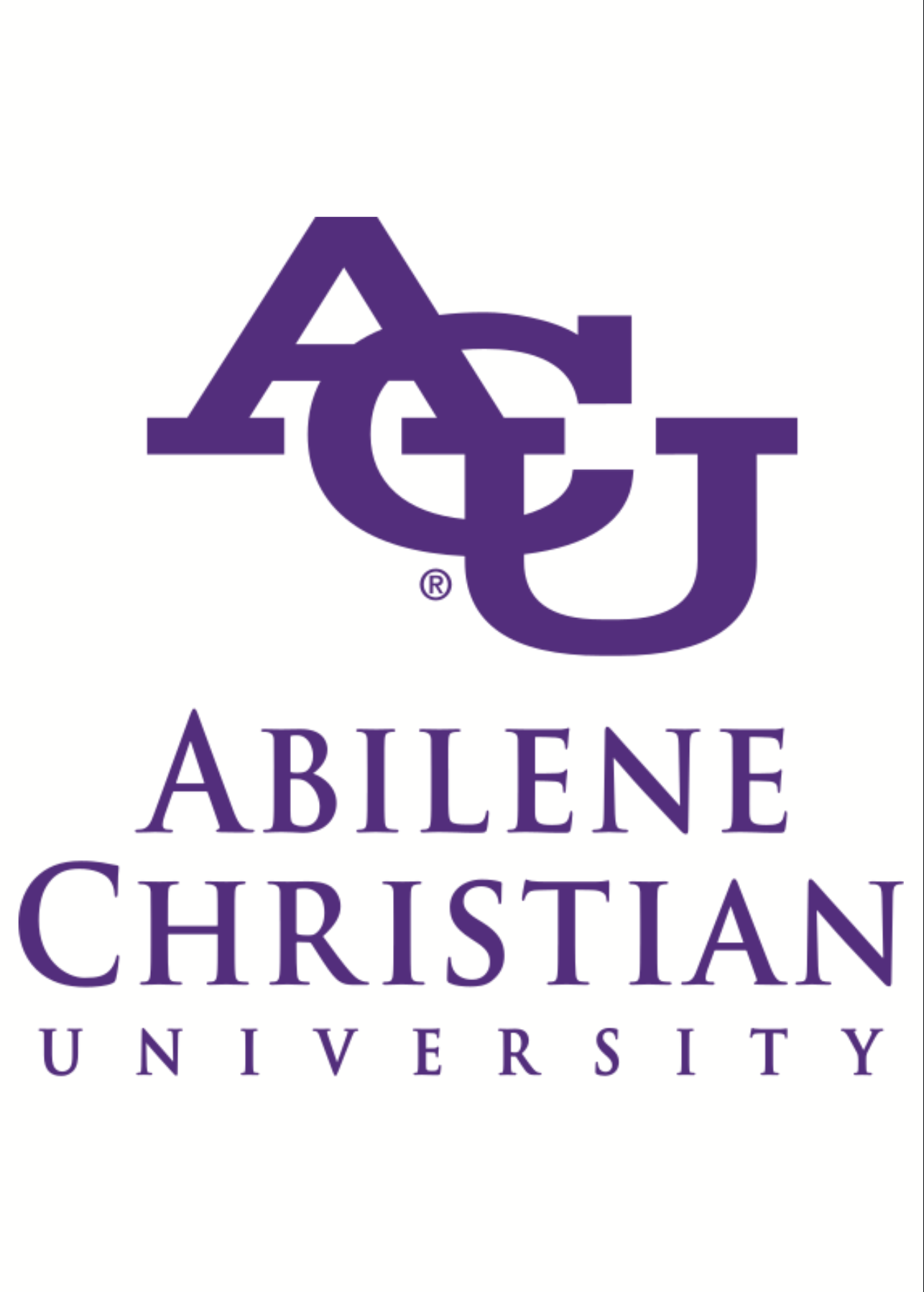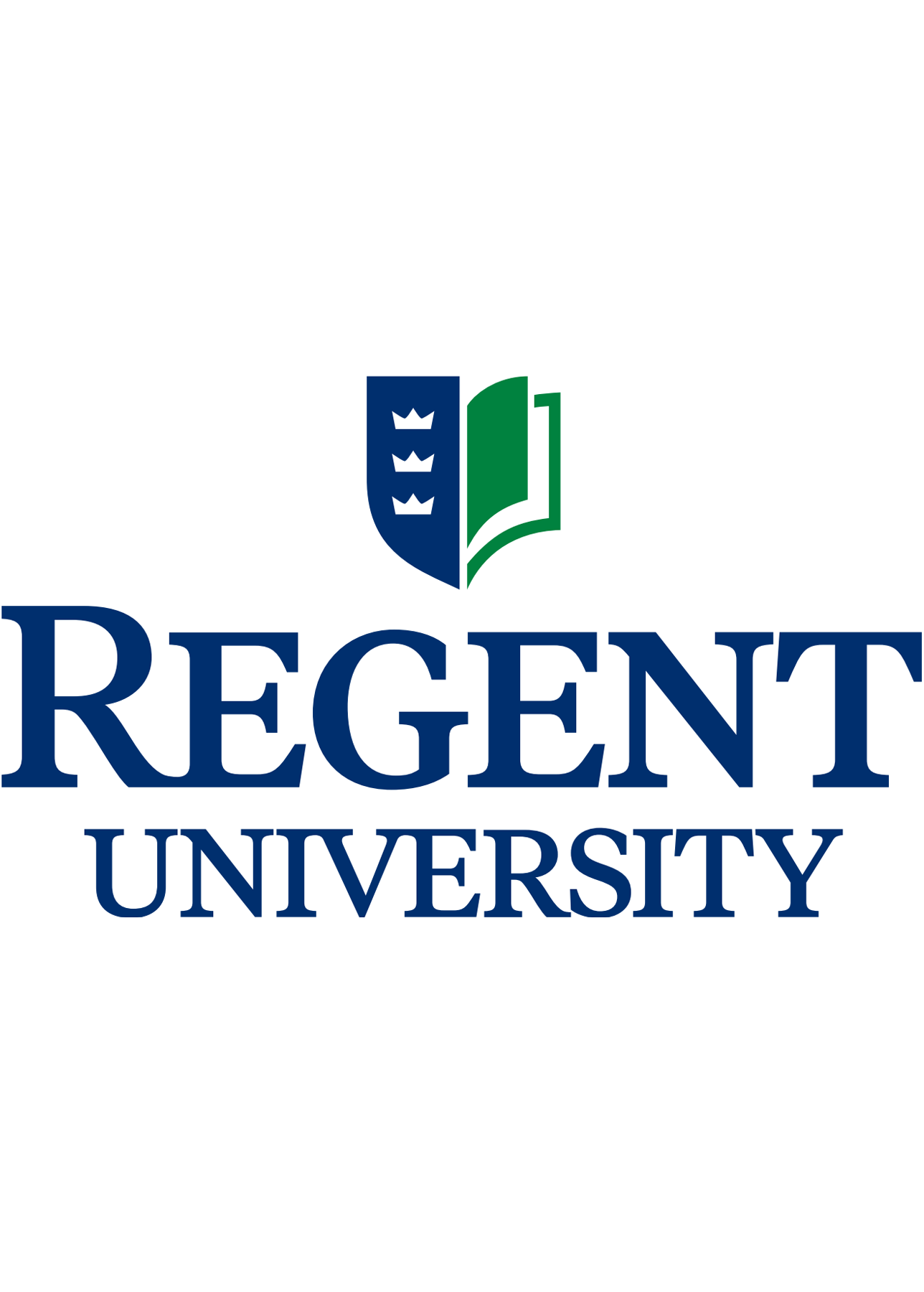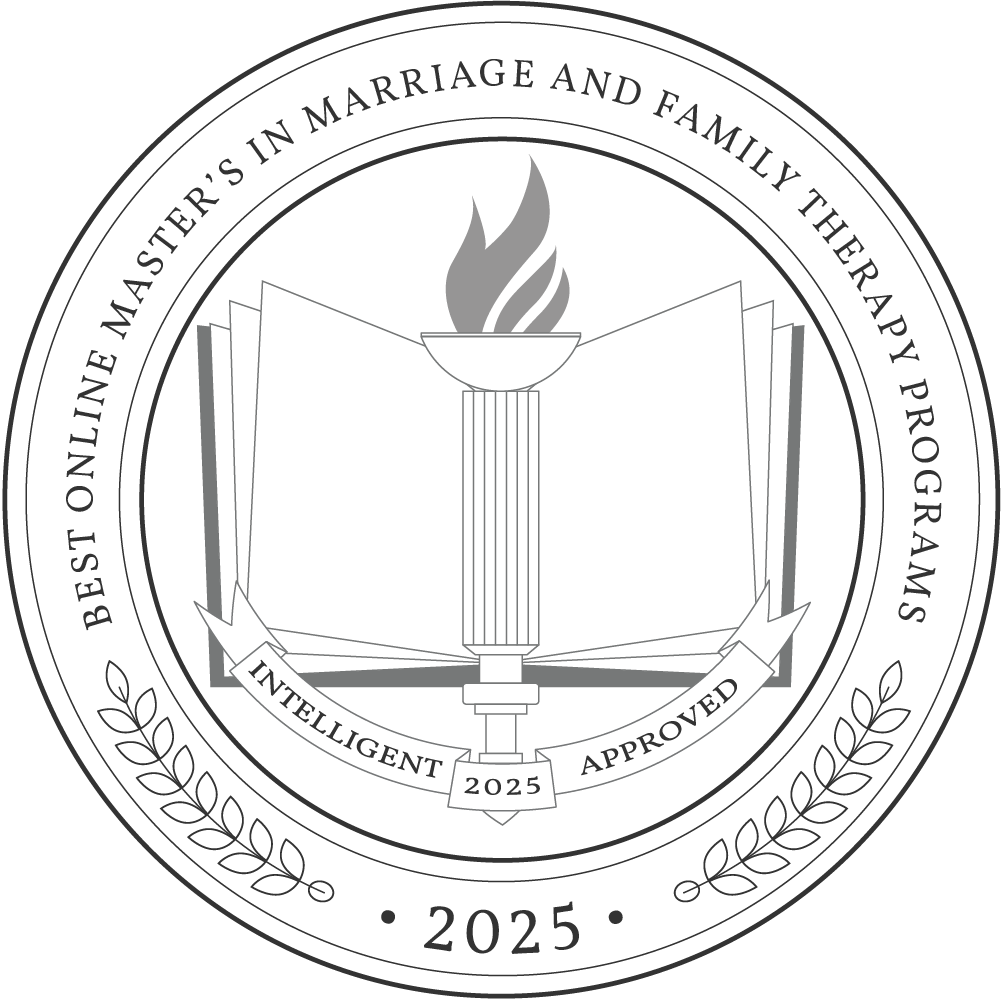Relationships are essential in our lives, yet communication, trauma, or abuse issues can negatively affect them. Marriage and family therapists work with individuals, couples, and families to heal trauma, establish better communication, and overcome other challenges in a safe, supportive environment. Earning a master’s in marriage and family therapy (MMFT) is a key step in pursuing a career in this field.
According to the Bureau of Labor Statistics (BLS), the employment of marriage and family therapists is expected to grow 15% through 2031. They earn a median annual wage of $58,510, with top earners making more than $104,710.
Intelligent.com reviewed dozens of online, in-person, and hybrid programs to compile this list of the best master’s in marriage and family therapy programs. We also interviewed Blanca Villagomez, a program coordinator and counselor at UC-Irvine, for insight into what students can expect from an MMFT program, the career outlook for this field, and how to choose the right MMFT program.
What Can I Expect from a Master’s in Marriage and Family Therapy?
According to the American Association for Marriage and Family Therapy (AAMFT), “Marriage and family therapists (MFTs) are mental health professionals trained in psychotherapy and family systems, and licensed to diagnose and treat mental and emotional disorders within the context of marriage, couples and family systems.”
While marriage and family therapy shares some commonalities with other mental and behavioral health professions, such as social work, psychology, and counseling, it is a distinct field with its own therapeutic approaches, research base, and client population. Although MFT is a specialization within the larger field of therapy, there are some focus areas for graduate students, including addiction and recovery in families, conflict and infidelity and marriage, trauma in relationships, LGBTQIA+ studies, and more.
The curriculum in MFT master’s programs consists of foundational and advanced concepts and skills in areas including clinical treatment with individuals, couples, and families; research and evaluation; contemporary issues in marriage and family therapy; working with diverse, multicultural, and underserved communities, and more.
Students are also expected to complete a supervised experiential learning component, such as a practicum or clinical internship, which, depending on the program, may be completed in person or remotely.
Besides a Master’s in Marriage and Family Therapy (MMFT), students may also encounter Master of Arts (MA) or Master of Science (MS) degrees. Different degree types have different pedagogical and theoretical approaches, but the curriculum should meet licensure standards as long as a program has accreditation from the Commission on Accreditation for Marriage and Family Therapy Education (COAMFTE).
Potential courses you’ll take in an online master’s in marriage and family therapy program
- Introduction to Family Therapy Models: Introduces the student to major family therapy theories and their relationship to general systems theory and cybernetics.
- Introduction to Systems Theory: Presents an overview of systems theory, particularly general systems theory, and cybernetics, and includes a critique of system theory from a feminist and cross-cultural perspective.
- Research in Couple and Family Therapy: Focuses on research methods for couple and family therapy, and is designed to review contemporary family research methods through a multi-method approach.
- Family Assessment and Evaluation: Focuses on issues in the clinical assessment of individuals, couples, and families. Assessment will be considered through a multi-method approach that includes: qualitative interviews, observational, clinician-rated or global rating scales, and self-report inventories.
Why Trust Us
The Intelligent.com Higher Education Team is dedicated to providing students with independent, equitable school and program rankings and well-researched resources. Our expert-driven articles cover topics related to online colleges and programs, paying for school, and career outlooks. We use data from the U.S. Department of Education’s College Scorecard, the National Center for Education Statistics, and other reputable educational and professional organizations. Our academic advisory team reviews content and verifies accuracy throughout the year for the most current information. Partnerships do not influence rankings or editorial decisions.
- Analyzed over 2,000 national, accredited, and nonprofit colleges and universities
- 800+ rankings pages are reviewed and updated yearly
- Content is informed by reputable sources, surveys, and interviews with academic advisors and other experts
- Over 100 data points are reviewed for accuracy and quality throughout the year, including sources
How we rank schools
Our list features the best online Marriage and Family Therapy degree programs at top colleges nationwide. Each school featured is a nonprofit, accredited institution — either public or private — with a high standard of academic quality for post-secondary institutions.
We evaluated each school’s program on tuition costs, admission, retention and graduation rates, faculty, reputation, and the student resources provided for online students. We collected data from trusted sources like the National Center for Education Statistics, individual school and program websites, school admissions counselors, and other data sources. Then, we calculated the Intelligent Score on a scale of 0 to 100 based on the following criterion:
Academic Quality:
- Admission rate versus enrollment rate
- Retention rate of students who return after year one
- Accreditation status (regional and programmatic)
- Nonprofit status, both private and public institutions
Graduation Rate
- Overall graduation rate
- Total number of currently enrolled students, including diversity metrics
- Student-to-faculty ratio
Cost and ROI
- In-state and out-of-state per-credit tuition rates and fees
- Required credits to graduate
- Earning potential after graduation
- Availability of federal student loans, scholarships, and other financial aid options
Student Resources
- Available student services for online-only and hybrid programs
- On-campus amenities like tutoring centers and the number of libraries
Read more about our ranking methodology.
Best 9 Master's in Marriage and Family Therapy Degree Programs
FiltersInstitution Type
Status
- Intelligent Score
- Alphabetically By University Name
- Acceptance Rate
- Enrollment
- In-state Graduate Tuition
- Out-of-state Graduate Tuition
- In-state Undergraduate Tuition
- Out-of-state Undergraduate Tuition

Touro University Worldwide
Intelligent Score: 99.52In-state: $14,400
Out-of-state: $14,400
In-state: $9,000
Out-of-state: $9,000
SAT: N/A
ACT: N/A
$525
Online
Commission on Accreditation for Marriage and Family Therapy Education
72

Syracuse University
Intelligent Score: 99.18In-state: $53,432
Out-of-state: $53,432
In-state: $40,392
Out-of-state: $40,392
SAT: N/A
ACT: N/A
$1,167
Online
Commission on Accreditation for Marriage and Family Therapy Education
60

Abilene Christian University
Intelligent Score: 98.44In-state: $37,750
Out-of-state: $37,750
In-state: $23,238
Out-of-state: $23,238
SAT: 1010-1220
ACT: 21-27
$799
Online
Commission on Accreditation for Marriage and Family Therapy Education
60

Pacific Oaks College
Intelligent Score: 94.72In-state: $11,692
Out-of-state: $11,692
In-state: $38,328
Out-of-state: $38,328
SAT: Not Required
ACT: Not Required
$1,210
Online
Western Association of Schools and Colleges Senior College and University Commission
61-62

Western Michigan University
Intelligent Score: 93.49In-state: $12,094
Out-of-state: $15,118
In-state: $16,360
Out-of-state: $16,360
SAT: 1010-1220
ACT: 20-27
Resident: $765
Non-Resident: $1,147
Hybrid
Council for Accreditation of Counseling and Related Educational Programs
60

National University
Intelligent Score: 92.71In-state: $13,320
Out-of-state: $13,320
In-state: $15,480
Out-of-state: $15,480
SAT: N/A
ACT: N/A
$913
Online
Commission on Accreditation for Marriage and Family Therapy Education
45

UMass Global
Intelligent Score: 92.67In-state: $15,791
Out-of-state: $35,779
In-state: $14,014
Out-of-state: $14,014
SAT: 1200-1390
ACT: 27-32
$709
Online
Western Association of Schools and Colleges Senior College and University Commission
60

Regent University
Intelligent Score: 91.66In-state: $17,220
Out-of-state: $17,220
In-state: $15,552
Out-of-state: $15,552
SAT: 940-1220
ACT: 21-29
$730
Online, On-Campus
Council for Accreditation of Counseling and Related Educational Programs
60

Northwestern University
Intelligent Score: 90.71In-state: $58,227
Out-of-state: $58,227
In-state: $56,067
Out-of-state: $56,067
SAT: 1430-1550
ACT: 33-35
$2,440
Online, On-Campus
Commission on Accreditation for Marriage and Family Therapy Education
67
Still Looking for the Right Fit? Discover Similar Programs
Students seeking a career focused on helping others and providing care for mental, behavioral, and emotional challenges have several educational options. Other programs to consider include:
What Can I Do With a Master’s in Marriage and Family Therapy?
For most students earning an MMFT, the goal is to become a licensed marriage and family therapist. To obtain the required state-issued license to practice professionally, MFTs must earn a master’s degree from a program accredited by the Commission on Accreditation for Marriage and Therapy Education (COAMFTE). Accreditation ensures that a program’s curriculum and clinical requirements meet professional training standards.
Once MFTs have their license, they can work in various settings, including private practices, hospitals, outpatient mental healthcare facilities, social service agencies, and more. They may provide general couples and family therapy services or specialize in an area such as addiction and recovery, infidelity counseling, or LGBTQIA+ issues.
Some students may decide to pursue further study, such as a doctorate in psychology, to conduct research, teach at the post-secondary level, or become licensed psychologists.
Career outlook
- Marriage and family therapists — Diagnose and treat cognitive, behavioral, or similar disorders in the context of couples and other relationships.
- Median annual salary: $58,510
- Projected employment growth (through 2032): 15%
- New jobs projected: 5,900 per year
- Social and community services managers — MFTs interested in leadership and administration can work in this capacity, coordinating and supervising programs and organizations that support public well-being.
- Median annual salary: $77,030
- Projected employment growth (through 2032): 9%
- New jobs projected: 16,000 per year
- Mental health counselors — MFTs often work with and treat clients coping with mental health challenges such as anxiety, depression, trauma, and more.
- Median annual salary: $53,710
- Projected employment growth (through 2032): 18%
- New jobs projected: 42,000 per year
How to Choose the Master’s in Marriage and Family Therapy Degree Program That’s Right for You
Step 1: Choose your area of study
Step 2: Research schools and programs
Step 1: Choose your area of study
“Before selecting a program, I encourage students to invest their time reflecting on their academic interests, career goals, and types of learning environments they thrive in to identify the best programs for them,” Villagomez says. “Understanding academic interests can help students determine whether MFT or a related area of study is the right path. I also encourage students to reflect on what types of goals they want to accomplish during college and what environments help them learn best, such as smaller classes, group work, or hands-on projects.”
At this point, students may also want to consider different specializations within MFT, like addiction and recovery in families, divorce/co-parenting, and grief and trauma. Deciding now if you want a program that focuses on one of these areas can help you narrow your search.
Students should also settle some logistical questions at this stage, including where they plan on getting licensed so they can enroll in a program that meets that state’s licensure requirements. Students should also determine if they want an in-person, entirely online, or hybrid program, whether they plan on enrolling full-time or part-time, and how they will accommodate clinical requirements in their schedule.
Step 2: Research schools and programs
Students should begin their search by confirming that any schools they’re considering are accredited by a recognized regional accrediting agency and COAMFTE. “With institutional accreditations, universities are evaluated as a whole and must achieve several standards to receive a regional or national accreditation,” Villagomez says. “Programmatic accreditations evaluate the quality and legitimacy of the specific degree programs offered at institutions. Attending a non-accredited college can negatively impact future post-graduate opportunities such as employment and doctorate programs.”
There are several ways to gather essential school information, including visiting their websites, contacting program representatives and admissions counselors, and following schools and programs on social media. Many online programs offer virtual events that allow students to interact with program representatives and students.
Students should be sure to get answers to the following questions:
- What does the curriculum consist of, including core classes and electives?
- Is the program taught from a religious perspective or secularly based?
- Does the program have capstone or thesis requirements?
- Who are the faculty, and what are their qualifications?
- What are the clinical requirements, and how are students assigned their placements?
- What support services are available to students, including academic and career advising, tutoring, counseling, and technical support?
Step 3: Prepare for applications and tests
“After conducting research on the degree programs and schools that are the best fit for them, students should have a strong sense of the admission requirements for those schools,” Villagomez says. “Requirements vary by school, so it’s important for students to stay organized with a comprehensive and detailed checklist to track their progress, submit all required materials, and meet deadlines. I encourage students to decide what systems help them organize the application requirements and track their progress for each school.”
A standard application for an MMFT includes the following:
- Application and fees
- Official transcripts from all undergraduate schools attended
- Letters of recommendation from faculty, employers, or colleagues
- Personal statement or essay
- Resume or CV
Depending on the program, students may have to meet specific eligibility requirements, such as a bachelor’s degree, particular coursework in psychology or a related field, or a minimum undergraduate GPA. Some programs may also require GRE scores as part of an application packet.
If there are specific application deadlines, submit all application materials promptly to ensure your decision, and potentially your enrollment, is on time.
Step 4: Select your program
After gathering information about potential schools and programs, compare them to your priorities. These priorities may include cost, program completion time, specialization options, or available financial aid. Select the program or programs that best meet your needs and submit your applications.
There’s no magic number of schools to apply to, with some students focusing on a single program that meets their specifications or applying to multiple schools to increase their odds of acceptance. If you are admitted to multiple schools, you can again compare them according to your priorities to find the best option.
Step 5: Determine how you’ll pay for your degree
During the research process, students should speak to a financial aid counselor and get information about the program’s total cost and available financial aid resources. Find out what type of institutional gift aid the school offers, like need- or merit-based scholarships or grants that don’t need repayment.
Students will also want to complete the Free Application for Federal Student Aid (FAFSA), which schools will use to determine eligibility for need-based aid, including student loans. Although private education loans are available, federal student loans have more favorable terms, interest rates, and repayment options.
Students can explore various other options to help pay for their MMFT degree. Many schools offer payment plans that allow students to pay in increments throughout the term. Individuals who are working while earning their degree can inquire about employer tuition assistance benefits. Veterans and active-duty service members may be eligible for military discounts on tuition and GI Bill benefits.
Frequently Asked Questions About Master’s in Marriage and Family Therapy Programs
Should I get a master's in marriage and family therapy degree in person or online?
This choice ultimately comes down to personal preference, as many quality MMFT programs are available online and in person.
“Online programs generally offer a combination of asynchronous and synchronous modalities, so expectations and pacing can vary greatly across courses,” Villagomez says. “With asynchronous courses, interactions with professors and classmates can be limited and may require more effort to stay connected. Meanwhile, synchronous courses can facilitate engagement more easily. Regardless of modality, all online degree programs require a high level of self-motivation, effective time management, and structured independent study.”
An in-person program might be a better option for students who learn best in group settings through discussions and hands-on activities, although students will have to find a program that fits into their schedule.
MMFT students should be aware that even if they can complete all their coursework online, they will likely have to complete an on-site clinical internship as part of their program. Students should speak with a program representative about these requirements and how online learners fulfill them.
How do I apply for a master's in marriage and family therapy program?
For the most specific information about how to apply to a program, contact an admissions counselor from the school. Every school’s application procedures differ slightly, so getting the most accurate information possible is important to avoid mistakes and delays.
Before starting an application, ensure that you meet the basic eligibility requirements for the program, which may include a minimum undergraduate GPA or a specific undergraduate major.
Most schools accept online applications and supporting application materials through an admissions portal. For a master’s program, students must typically submit an application and fees, official transcripts from all undergraduate schools attended, a resume or CV, letters of recommendation, and a personal essay. Some programs may require an interview or GRE scores.
How much does a master's in marriage and family therapy cost?
The average cost of a master’s degree in the U.S. is $65,134, according to the Education Data Initiative. However, what an individual student pays for their MMFT can vary widely based on several factors. Students should contact their school’s financial aid department for the most accurate information about what a program costs.
A key factor is whether a school is public or private. Public universities tend to be less expensive than private schools, but most charge different rates based on whether a student resides in-state or out-of-state. Many public schools charge the same tuition rates for online students regardless of where a student lives.
Students must also factor in expenses like school fees, books and supplies, and living expenses. In-person students must consider room and board if they live on campus or transportation expenses if they commute. Online students must ensure they have reliable internet and a working computer.
How long does it take to complete a master's in marriage and family therapy?
Completion time depends on the number of credits the specific program requires. Most programs require 45-60 credit hours, which can take two to three years of full-time attendance to complete. Students who enroll on a part-time basis may take longer.
Some schools offer accelerated programs that allow students to take courses at a faster pace to earn their degrees quicker. Another option is a bachelor’s-to-master’s program enabling students to earn both degrees in five years.
Is a master's in marriage and family therapy degree worth it?
Working with couples and families to improve their relationships and break unhealthy cycles and patterns can be incredibly rewarding. However, any therapy job requires compassion, empathy, patience, and interpersonal skills. It can be mentally, emotionally, and physically demanding, so students should carefully consider if they have the right qualities and passion for this field.
Earning a master’s degree makes graduates eligible for professional licensure, which is required for most MFT jobs. Regarding ROI, pay varies for MFTs. As of May 2023, the median annual salary was $58,510. The top earners in the field made upwards of $104,000, while the lowest-paid earned less than $39,090.
Read More about Online Master’s in Marriage and Family Therapy Degrees
Compare School Options
Related Degrees
- Organizational Psychology
- Addictions and Recovery
- Educational Psychology
- Counseling
- Psychology
- Christian Counseling
- Child Development
- Forensic Psychology
- Christian Counseling Program
- School Counseling


